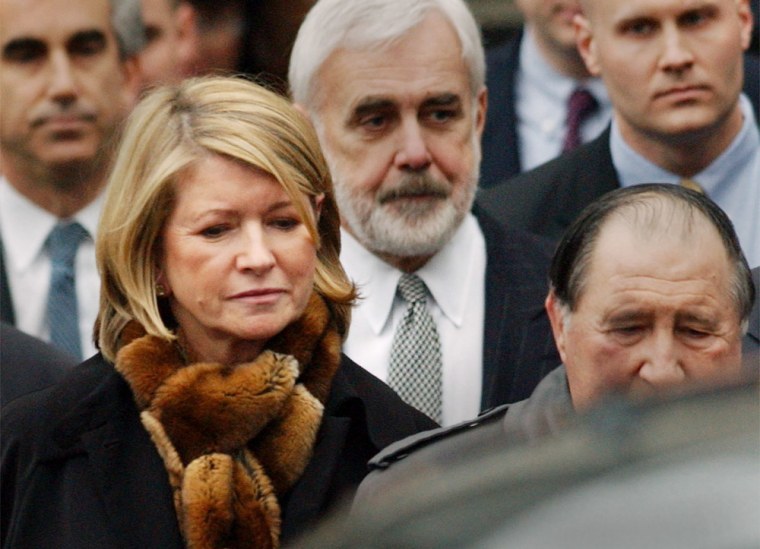Martha Stewart predicted she would be “completely exonerated” on appeal after a jury delivered a devastating verdict that could take her from the top of a homemaking empire once worth $1 billion to the inside of a prison cell.
Only a slight grimace at the sound of the word “guilty” broke the stoic face that Stewart had maintained throughout the six-week trial.
“I will appeal the verdict and continue to fight to clear my name,” she said in a statement issued just minutes later. “I believe in the fairness of the judicial system and remain confident that I will ultimately prevail.”
Stewart herself did not speak as she swept down the stairs of the lower Manhattan courthouse and into a waiting sport-utility vehicle.
A jury of eight women and four men deliberated 12 hours over three days before returning guilty verdicts Friday on all four counts against Stewart — conspiracy, obstruction and two counts of making false statements.
All the charges relate to an accusation that Stewart lied to cover up the reason she sold 3,928 shares of ImClone Systems stock on Dec. 27, 2001 — avoiding a hefty loss when the company announced bad news the next day.
The broker who handled the sale, Peter Bacanovic, was convicted of obstruction, making false statements, conspiracy and perjury, but was acquitted of falsifying a document. He, too, vowed to appeal.
While the charges carry maximum prison terms of 20 years for Stewart and 25 for Bacanovic, federal guidelines could reduce both to a year or so in prison. Sentencing was set for June 17.
“Maybe it’s a victory for the little guys who lose money in the market because of these kinds of transactions,” said juror Chappell Hartridge.
The verdict jeopardizes the media empire that Stewart carefully built over the years in becoming the nation’s premier homemaker — an image she put forth by way of magazines, television programs and everything from cookie cutters and garlic presses to bed sheets and pillows.
Marketing experts have said that the company is so closely tied to her name and face that the effect could be devastating, and stock in her company, Martha Stewart Living Omnimedia, fell more than 22 percent after the verdict.
Stewart’s syndicated television show, “Martha Stewart Living,” is being pulled from CBS’s New York affiliate following the conviction. The New York Times and the New York Post reported Saturday that WCBS will pull the plug on the show as of Monday and other CBS stations may follow suit.
Stewart had a reputation before the trial as a ruthless businesswoman, and in court she was portrayed as rude, insulting, demanding and cheap. According to testimony, she once threatened to take her business elsewhere because she did not like her brokerage’s telephone hold music.
She did not testify at the trial, and her defense put on just one witness — an unsuccessful gamble that jurors would decide the government had not met its burden of proof.
“I would have liked to have heard from her,” Hartridge said. “I would have loved to have heard the other side of the story.”
The charges centered on why Stewart dumped about $228,000 worth of ImClone Systems stock in 2001, just a day before it was announced that the Food and Drug Administration had rejected ImClone’s application for approval of a cancer drug. The announcement sent ImClone’s stock plummeting.
Stewart and Bacanovic claimed they had a standing agreement to sell when the price fell below $60. But the government contended that was a cover story and that Stewart sold because she was tipped by her broker that ImClone CEO Sam Waksal was frantically trying to dump his own holdings.
Waksal later admitted selling his stock based on advance word of the FDA decision. He is serving seven years in prison for insider trading.
Stewart, who averted more than $51,000 in losses by selling when she did, was not charged with insider trading.
Instead, she and her broker were accused of lying about the transaction and altering records to support the cover story.
Outside the courthouse Friday, U.S. Attorney David Kelley said all Americans were victims of Stewart and Bacanovic’s crimes because lies to investigators weaken the nation’s law enforcement system.
“When we first indicted this case, we said it was about lies, all about lies,” Kelley said. “As you saw in the evidence, that’s what it was.”
The government’s star witness was Douglas Faneuil, a former Merrill Lynch & Co. assistant who said he passed the tip about Waksal to Stewart on orders from his boss, Bacanovic. He also said Bacanovic pressured him to lie.
Other critical testimony came from Ann Armstrong, Stewart’s assistant, who said Stewart personally altered a phone message from Bacanovic; and Mariana Pasternak, a longtime Stewart friend, who said Stewart confided to her days after the ImClone sale that she knew Waksal was trying to sell.
Pasternak said Stewart added: “Isn’t it nice to have brokers who tell you those things?”
But Pasternak admitted on cross-examination that the remark may have been something she herself thought, not something Stewart said.
With Stewart’s conviction, the government may press to have her removed from the board of her company. She stepped down as chief executive after being indicted last summer but remains as chief creative officer.
Stewart could also face up to $1 million in penalties for the criminal convictions, besides fines the Securities and Exchange Commission may seek.
Stewart was easily the most recognizable face in the government crackdown on corporate crime that began with the collapse of Enron in 2001. Stewart’s supporters claim she was being targeted because of her celebrity status.
